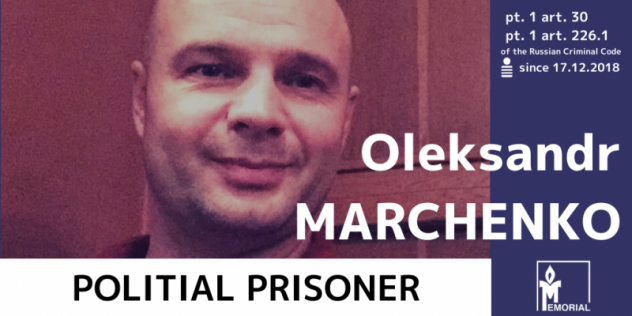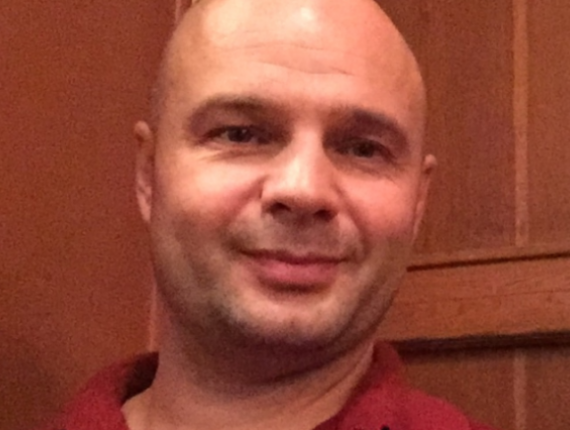Ukrainian citizen Oleksandr Marchenko, awaiting sentence in a Krasnodar remand centre, is a political prisoner, Memorial says
He was charged with preparing to acquire and illegally export military-related equipment from Russia
Oleksandr Marchenko is a Ukrainian citizen who was arrested on 17 December 2018 by security agencies of the self-proclaimed Donetsk People’s Republic. On 18 February 2019, after being held in a detention facility for two months by the Ministry of State Security of the Donetsk People’s Republic, Marchenko was transported to the border of Ukraine’s Donetsk and Russia’s Rostov regions and handed over to officials from the Russian Federal Security Agency (FSB).
A criminal case against Marchenko was opened only on 30 April 2019. Until then, Marchenko was held in jail for almost two and a half months by means of a series of convictions for offences under administrative law, and he was also held in the Krasnodar Krai deportation centre. However, instead of being deported to Ukraine, Oleksandr was placed in a pre-trial detention facility on charges of preparing to acquire and illegally export military-related equipment from Russia.
According to the investigators, in the spring of 2018 Oleksandr Marchenko, together with an accomplice from Russia, developed a plan to purchase and take across the Russian-Ukrainian border two sets of specialized linear-beam vacuum tubes (known as klystrons) designed for use in S-300 surface-to-air missile systems. Marchenko’s lawyer has stated that his client is innocent of the charges, that the conditions of Marchenko’s detention in the Donetsk People’s Republic were tantamount to torture, and that a confession made at the border was forced from him by the security services.
Memorial has studied the materials of the administrative and criminal cases against Marchenko to which we have access and has found that Marchenko repeatedly and without difficulty crossed the Russian border, allegedly in preparation for the crime with which he has been charged. However, the impulse for his prosecution was the time he was held in detention by the Ministry of State Security of the Donetsk People’s Republic. No trust can be placed in evidence obtained on a territory where the norms of Ukrainian, Russia and international law are not operative. However, even this alleged evidence was not used as grounds for his immediate prosecution. In Russia Marchenko was held for more than two months in a gaol for those convicted of administrative offences and in a detention centre for foreigners and persons without citizenship.
The charges are based on correspondence that allegedly took place in the spring and summer of 2018 between Marchenko and a Russian partner, and also on testimony that has been classified. The transfer of money for the purchase of the klystrons was allegedly made between Ukrainian and Russian banks that have not been officially identified. In our view, the lack of a criminal investigation is explained by the talks between Ukraine and Russia about a possible ‘exchange of prisoners.’ In sum, the case depends not on the gathering and examination of evidence as to whether Marchenko is guilty or innocent, not on the adversarial nature of the legal process, but on behind-the-scenes agreements at various levels. We believe that Oleksandr Marchenko has been deprived of liberty, on the one hand because of the on-going anti-Ukrainian campaign by the Russian authorities, and on the other hand because of the attempt by the Russian authorities to underpin the thesis of large-scale external security threats to the country on the basis of new, but fabricated, ‘espionage’ cases.
The Memorial Human Rights Centre, in accordance with international guidelines, has recognised Oleksandr Marchenko as a political prisoner.
You can read more about this case on our website here.
Recognition of an individual as a political prisoner, or of a prosecution as politically motivated, does not imply that the Memorial Human Rights Centre shares or approves the individual’s views, statements or actions.
PayPal — an e-wallet for giving help to all Russian political prisoners helppoliticalprisoners@gmail.com.




